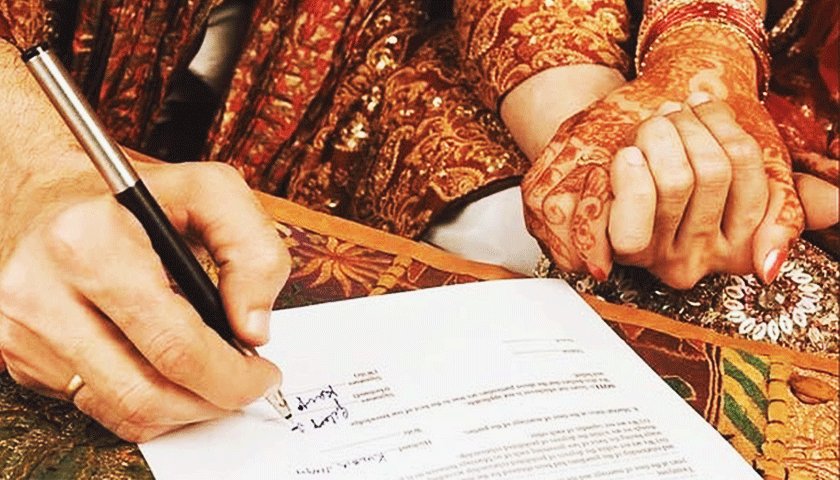Court marriage in Jhajjar, considered an archaic custom is still prevalent in Rajasthan. This practice has been restricted by the new Indian Constitution, which guarantees all citizens equal rights irrespective of religion, caste or the sex. Although arranged marriages are allowed under the new Indian Constitution, the custom of court marriage is not. Unlike in the past, nowadays when a person is ready to get married the bride has to be forced to do so. It is this ritual that is associated with dowry system. Court marriage in Jhajjar can take place under different sets of circumstances. The most common scenario for these marriages is when both the families are economically and socially backward. dowry system was once a very common practice in India but it has been replaced by the court marriage system today. There have also been cases where the bride's family pressures her to get married and force her to marry against her will. Another example is when there may be some property issues or disputes over between the two families. In such a case, both the families arrange marriages. In order to complete the marriage, the bride's family may pay a dowry to the groom's family. However, this is something that is not practiced anymore in court marriage in Jhajjar. Today, it is understood that dowries should not be paid or given in any cases. Court marriage in Jhajjar is usually arranged by the bride's family or elders. The dowry is usually given by a local elder. Many times the dowry is just a gift to show respect and that the marriage is being arranged according to the wishes of the bride. However, the dowry is usually a very small amount of money and this is given to help the bride financially during her wedding. This is one reason why most marriages these days are arranged. Court marriage in Jhajjar does not have much of a stigma attached to it anymore, unlike the arranged marriages. In most cases, people view it as a last option when all other options have failed. But today, with more awareness, people have started arranging their own weddings without involving anyone else. In fact, many people would like to convert this type of marriage to a more secular type. The society of the Arya Samaj is also traditional to related readings of the Vedas such as the Upanishads. In fact, most related readings are derived from the Upanishads and considered part of the hymns of the Hindu religion. A person who holds a valid Arya samaj marriage certificate is entitled to castigate his or her parents for any fault, according to the Hindu law. According to traditional laws of India, marriage is only instituted for the benefit of both the male and female beings. This union is considered to be a boon and gift from the almighty. Thus, a person having an arranged marriage will be blessed with material, mental, emotional, social and spiritual benefits. On the other hand, a divorce brings down the social status of an individual and also his or her material, mental, emotional, social and spiritual welfare is affected.
Court Marriage is a common procedure, which has to be followed by everyone. If a marriage is not registered it is not considered valid during legal procedures such as, applying for a joint home loan. You could also be fined for not registering your marriage. It is a rule that all the marriages have to be registered whether you are having a wedding ceremony or not.
A marriage certificate is an important proof, in case there are some problems between you and your spouse in the future and a legal action needs to be taken.
Advantages of Court Marriage Certificate:-
• Certificate of Marriage is a document, which provides valuable evidence of marriage;
• Certificate of Marriage is a document providing social security, self-confidence particularly among married Women.
• Court Marriage Certificate is useful in getting the visa for the wife/husband.
• It will be helpful in claiming the Bank deposits or Life Insurance benefits when the depositee or the Insurer dies without a nomination or otherwise.
Documents required for the Performance & Registration of Court Marriage
1. Passport Size Photographs – four each of Marrying Persons.
2. Residential Proof (Voter Card / Passport / Ration Car / Driving License / Bank Passbook / Lease Deed / Rent Deed) of Marrying Persons.
3. Date of Birth Proof (Municipal Corporation Certificate, X th or XII th Examination Certificate, Passport, PAN Card) of Marrying Persons.
4. If any party is divorcee Certified copy of Decree of Divorce granted by the Court.
5. If any party is widow / widower Death Certificate of the dead spouse.
6. If any party is a Foreign Citizen or holding a foreign Passport or is having foreign residential address – Certificate of Present Marital Status of the party / No Impediment Certificate / NOC from concerned Embassy and Valid VISA.
7. Two Witnesses (Both should be major)



